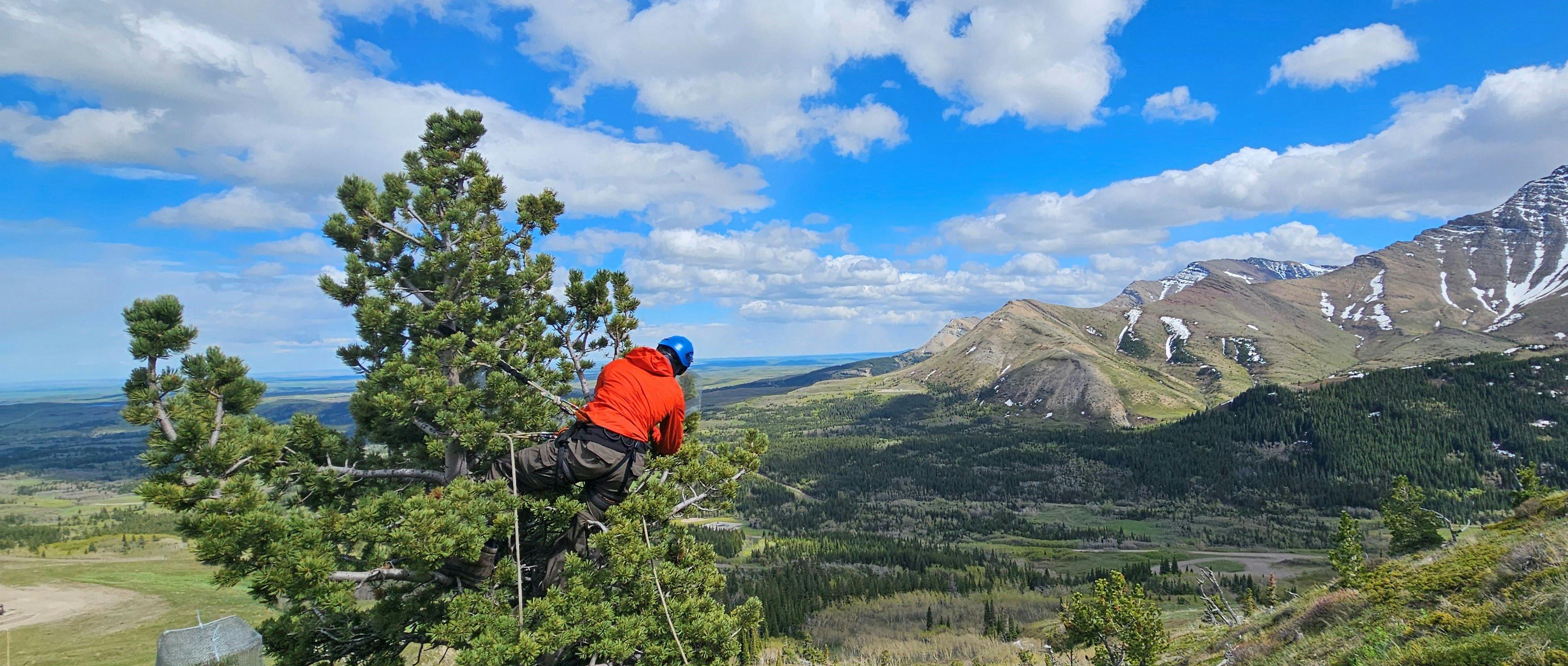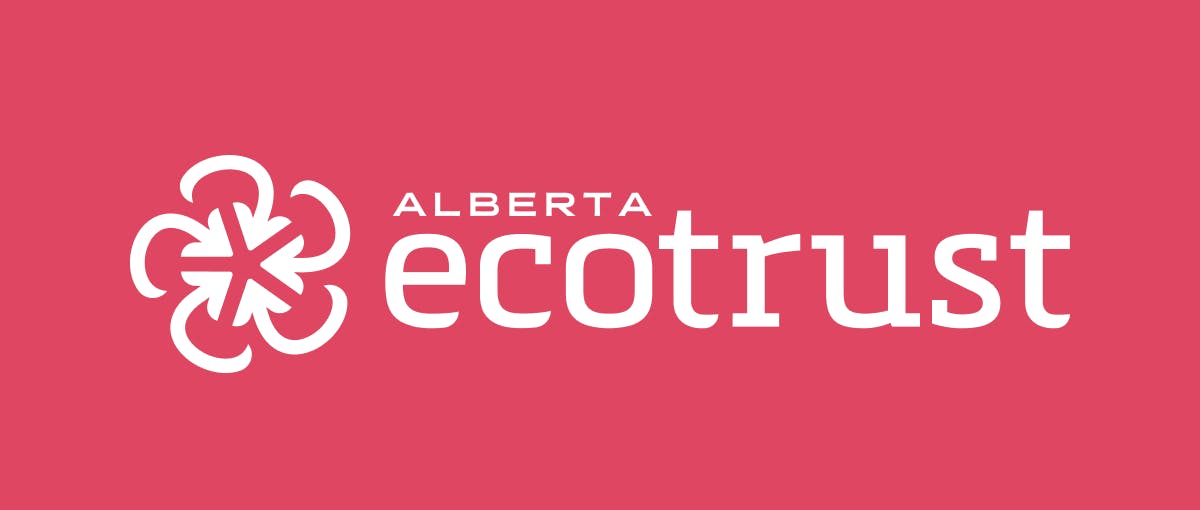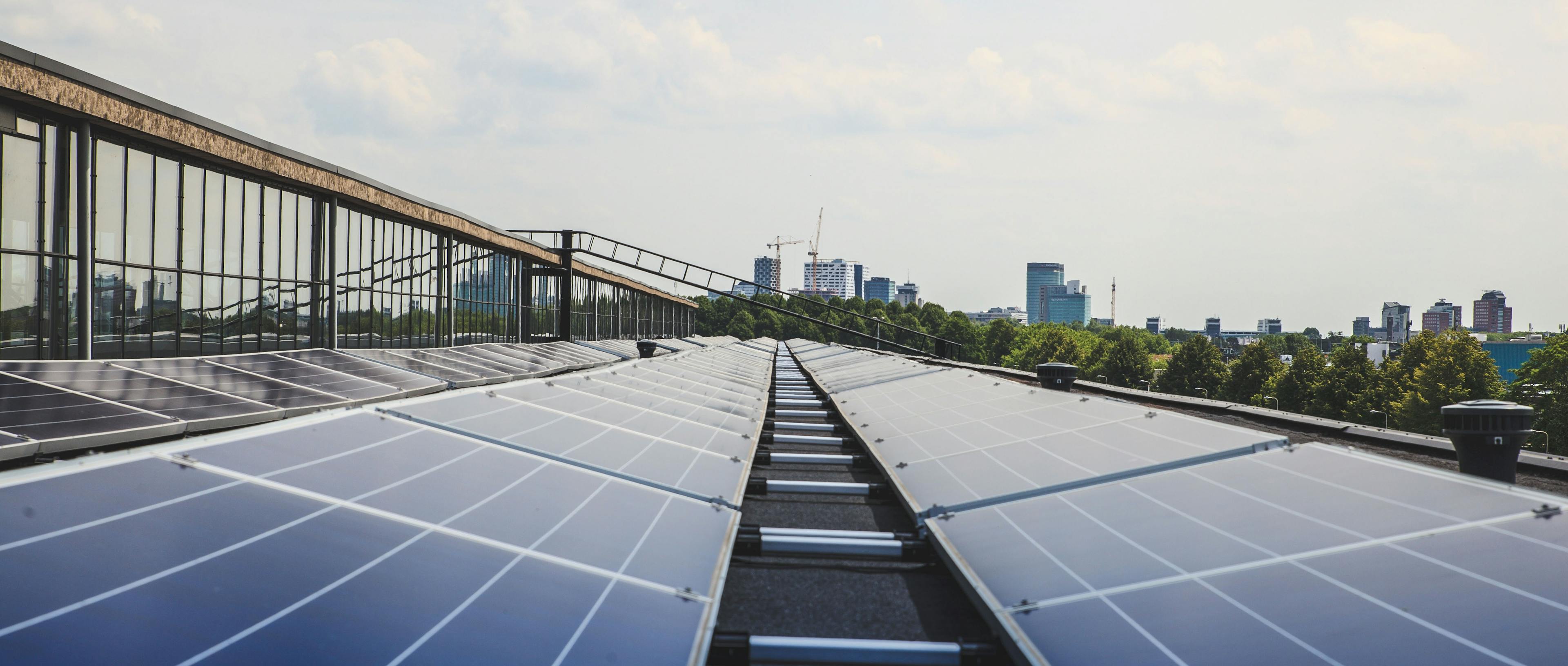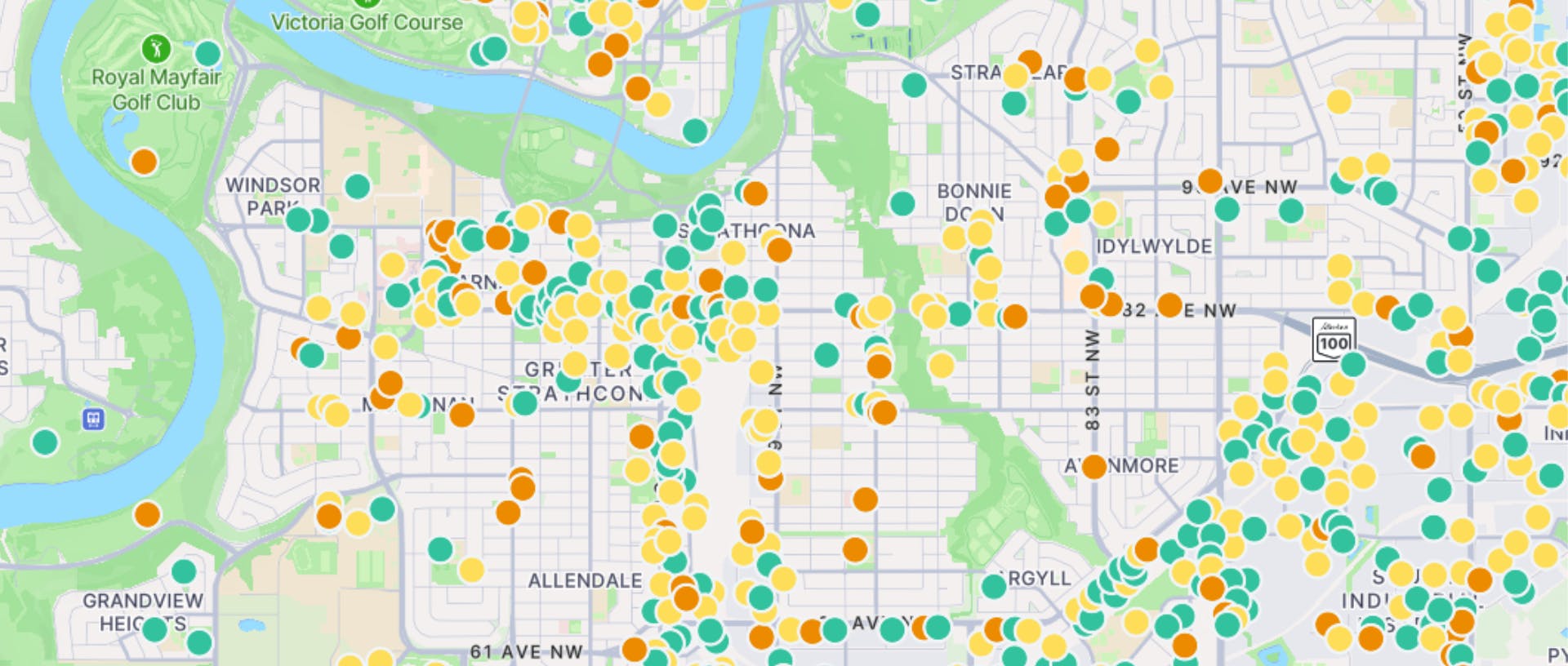Alberta Ecotrust grants $745,000 to support local environmental projects

10 minutes
Announcement
Jun 3, 2025
Reading Time
Category
Date
Photo credit: Whitebark Pine Ecosystem Foundation of Canada
Alberta Ecotrust Foundation has awarded $745,939 in funding to 13 organizations and First Nations across the province through its 2025 Environmental Impact Grant. The funding supports community-led projects in Alberta that address pressing environmental challenges, including land and water conservation, climate resilience and circular economy initiatives.
“This year’s projects range from breathing new life into salvaged bikes in Edmonton and building a culture of repair in Lethbridge, to restoring endangered whitebark pine, enabling Indigenous Nations to lead land conservation and piloting beaver coexistence strategies in the Waterton Biosphere,” said Lori Rissling Wynn, Director of Grants and Initiatives at Alberta Ecotrust. “We’re proud to support this incredible cohort as they bring us closer to an Alberta where people and nature truly thrive.”
The recipients of the 2025 Environmental Impact Grant and their projects are:
Alberta Biodiversity Monitoring Institute | From access to action: Geospatial capacity within Indigenous Communities
Indigenous communities face significant barriers in accessing and utilizing geospatial data for land management and environmental monitoring. To address this, the Alberta Biodiversity Monitoring Institute is partnering with the Lakeland Métis Nation (LMN) and the Institute of Prairie and Indigenous Archaeology (IPIA) to co-develop an education program that empowers communities to harness these tools. Through workshops, user guides and one-on-one support, this project will collaboratively build capacity to support land management decision-making that aligns with LMN’s priorities, from environmental stewardship to cultural preservation. The program will serve as a model for broader geospatial education and support across additional Indigenous communities.
Alberta Tomorrow Foundation | Incorporating the Alexander Cree First Nation water resiliency report and Indigenous knowledge into the Alberta Tomorrow Land Use Planning Simulator
Historically, land use and environmental change on Indigenous lands have largely been ignored. However, things are changing. The Alexander First Nation is taking planning into their own hands and has contracted Magna Engineering to complete a water resiliency study for the Nation that looks at how land use activities may impact water resiliency for the Nation. Alberta Tomorrow will work with the Alexander First Nation and Magna to create two different simulations. First, they will model the results of the water resiliency study to help visualize change that needs to take place on and surrounding the Nation to ensure good quality and quantity of water for the future. Next, they will use information gathered from Elders and leaders to create an educational land use simulation for the area traditionally used by the Cree people, which uses Indigenous indicators to visualize change in the past and in future land use planning. This simulation will be available for free to all Indigenous and public schools and for teachers teaching the new social studies curriculum. This tool will enable both Indigenous and settler students to use an Indigenous lens when talking about treaties, the land, rights and responsibilities.
Bike Edmonton Society | Old Bike, New Life
Old Bike, New Life is Bike Edmonton (BE) Society’s response to Edmonton’s growing need for accessible and sustainable bike solutions. This project salvages bikes from landfills and either repairs and returns them to the community or strips them for parts to fix others. The program also supports riders by providing a free BE membership with each bike, encouraging them to continue to engage in circular activities. Focused on improving mobility for low-income communities, this initiative is strengthened through partnerships with other local organizations. Cycling for transportation drastically reduces emissions, and by offering tools, education and support, they further reduce the environmental impact of cycling.
Canadian Parks and Wilderness Society, Northern Alberta | Breaking down barriers: Empowering Albertans to stand up for nature and climate on Alberta’s public lands
Alberta’s public lands, which provide vital ecological services, are threatened by fragmented and inconsistent management and policy initiatives. Initiatives, like the development of Alberta’s Nature Strategy, present opportunities for the public to advocate for nature. However, complexities and overlapping timelines hinder engagement. The Canadian Parks and Wilderness Society (CPAWS) will empower Albertans to advocate for a robust nature strategy and participate in other public land management engagement opportunities by providing simplified analyses, resources and supporting collaboration. By uniting Albertans around shared environmental interests, building political literacy and fostering grassroots capacity, they aim to ensure sustainable and equitable land management for the benefit of humans and nature alike.
Environment Lethbridge Council | Squaring the circle: Expanding the circular economy in Lethbridge
Delivered by Environment Lethbridge in cooperation with community partners, this project will elevate the opportunities for Lethbridge residents to extend the life of household items, reducing waste and saving money. This work will raise the profile of the circular economy in Lethbridge and offer a coordinated approach that makes it easy for residents to reuse and repair, resulting in a cultural shift towards the circular economy.
Nature Conservancy of Canada | Indigenous engagement in land conservation on NCC lands across Treaty 6 and Treaty 7 Alberta
The Nature Conservancy of Canada (NCC) plans to accelerate its ability to facilitate Indigenous reconnection to the land and amplify the application of Indigenous Knowledge in its conservation and stewardship practices, particularly in regard to Indigenous Cultural and Ancestral Sites. The intent is to ensure a “two-eyed seeing” approach in how NCC operates. The initial partners will begin with their current relationships in Treaty 7 with the Siksika Nation, Kainai Nation, Piikani Nation, Amskapi Piikani Nation, Ktunaxa Nation, Yait ʔa·knuqⱡiʾit, ʔaam, Tsuut’ina Nation and Îyârhe Nakoda First Nation, as well as the Métis Nation of Alberta in Treaty 6.
North Saskatchewan Watershed Alliance Society | Transforming watershed management: Introducing the Freshwater Health Index to Alberta
The North Saskatchewan Watershed Alliance (NSWA) is pioneering the adaptation of the Freshwater Health Index (FHI) in North America to enhance watershed management. By integrating evaluations of ecosystem vitality and services with governance and equity, the FHI offers a more holistic alternative to traditional watershed assessments. This project will develop guidance materials, pilot FHI use in Alberta sub-basins and identify barriers to implementation. Through collaboration with the Athabasca Watershed Council, the Vermilion River Watershed Alliance, stakeholders, rightsholders and experts, NSWA is driving a scalable, science-based approach that strengthens watershed health reporting, ensuring sustainable and inclusive water management for Alberta and beyond.
Riparian Management Society | Beavers on the move in the Waterton Biosphere Region
Beavers are keystone species, improving water quality, reducing flood peaks, storing water, improving drought resilience and expanding wetlands, which often lead to conflicts with humans. Working with Beavers (Cows and Fish and Miistakis Institute) is receiving growing requests for beaver relocation, but there is no defined process in Alberta to move beavers. Working with the Waterton Biosphere Reserve Association in this pilot project, three organizations will address the regulatory, practical and human situations necessary to successfully relocate beavers, for the beaver and human community. They will work with local landowners in the Pincher Creek region, identifying interested recipients and neighbourhoods with suitable habitat, and then use best practices, identified from a review of other jurisdictions, to relocate beavers. By sharing lessons on best practices and offering recommendations to practitioners and government policymakers, they will have large-scale climate and ecosystem benefits.
Siksika Nation | The Siksika Nation Freshwater Stewardship and Cultural Knowledge Project
Siksika Nation holds significant cultural knowledge on the sustainable management of water, land and natural resources, yet their perspectives are often missing in water assessment activities and conservation efforts. The Siksika Nation Freshwater Stewardship and Cultural Knowledge Project aims to bridge this gap by enhancing Siksika's participation in Alberta's freshwater management. Through capacity building, partner collaborations, cultural knowledge documentation and the development of biocultural indicators, the project seeks to integrate Indigenous and Western knowledge systems and support a more inclusive and holistic water assessment framework that incorporates Siksika’s values and perspectives in the evaluation of freshwater habitat and health.
Sturgeon Lake Cree Nation | Sturgeon Lake Cree Nation fish and plants abundance conservation development
Sturgeon Lake Cree Nation (SLCN) will undertake a cultural and environmental research study to explore the impacts the oil and gas industry and farming have on traditional practices on ancestral lands. Elders have concerns that Treaty Rights, such as hunting, fishing, trapping and medicine harvesting, are impacted by heavy oil and gas and farming practices. Elders would like to develop conservation efforts to improve areas to practice Treaty Rights by collecting samples for water, fisheries and soil and host engagement sessions. SLCN acknowledges that the combination of its citizens' and members' knowledge of the land, combined with Western methods, will create a pathway to achieve their research goals and develop conservation objectives.
Treaty 4 & 6 Land Sharing Network | Shared lands, shared futures: Making farmland accessible for Indigenous ways of life in Treaty 6
Land is essential to Indigenous ways of life, yet in the prairies, most land is privately owned and off-limits. The Treaty Land Sharing Network (TLSN) works to restore Indigenous Peoples’ access to agricultural land. Landholders in TLSN recognize the importance of sharing land as the Treaties intended and welcome Indigenous people to access food, medicines and ceremonial sites. Shared Lands, Shared Futures aims to increase available land in Alberta by partnering with organizations and hosting educational events to grow its membership. Through land sharing, Indigenous and non-Indigenous communities strengthen their connection to the land, deepen conservation practices and honour Treaty relationships.
Whitebark Pine Ecosystem Foundation of Canada | Restoring keystone species: Advancing science and collaboration for whitebark and limber pine recovery
Advancing science and collaboration for whitebark and limber pine recovery is a nationwide project led by the Whitebark Pine Ecosystem Foundation of Canada, in partnership with federal agencies, provincial governments, NGOs and key interest holders. This effort focuses on restoring endangered whitebark and limber pine in Canada’s high-altitude forests. By strengthening biodiversity, enhancing ecosystem resilience and conserving culturally significant trees, this project addresses urgent environmental challenges. Through science-based management, strong conservation principles and collaborative relationships with collaborators, this initiative ensures these keystone species will sustain wildlife, protect watersheds and support communities for generations to come.
Yellowstone to Yukon Conservation Initiative | Supporting the establishment of Indigenous protected and conserved areas in Alberta
Alberta’s Eastern Slopes and headwaters lack permanent protection. Indigenous Nations have conservation visions, but there are no clear pathways for realizing their stewardship visions and protecting lands outside of reserves. Building upon a model developed by the Yellowstone to Yukon Conservation Initiative (Y2Y) in other geographies, they will undertake a two-pronged approach to bolster Indigenous-led conservation. First, they will work to create conditions needed for a strong conservation policy that maintains existing protections and expands them to other critical lands and waters, including via Indigenous-led protected areas. Second, Y2Y will support Indigenous Nations, when invited, to advance projects that strengthen the foundation of stewardship and conservation towards conservation goals.
The Environmental Impact Grant provides up to $50,000 for eligible projects, with as much as $100,000 available for collaborative, high-impact initiatives. Since it began in 1992, the grant has supported 921 projects and allocated more than $20.2 million.
For more information on the Environmental Impact Grant, please use this link.
About Alberta Ecotrust Foundation
Alberta Ecotrust Foundation is a trusted leader in advancing environmental and climate solutions across Alberta. We collaborate with diverse partners from government, industry, non-profits, and Indigenous communities to create a future where both people and nature thrive. Since 1991, Alberta Ecotrust has mobilized resources, delivered innovative programs, and supported impactful projects that protect and restore natural ecosystems, reduce greenhouse gas emissions, and build community resilience. Alberta Ecotrust is a founding member of the Low Carbon Cities Canada network, a national initiative accelerating equitable climate solutions in cities.
Media Contact
Jessie Cheveldayoff
Communications Specialist, Alberta Ecotrust Foundation
j.cheveldayoff@albertaecotrust.com
403.209.2245
Related posts
Explore our most recent posts.


